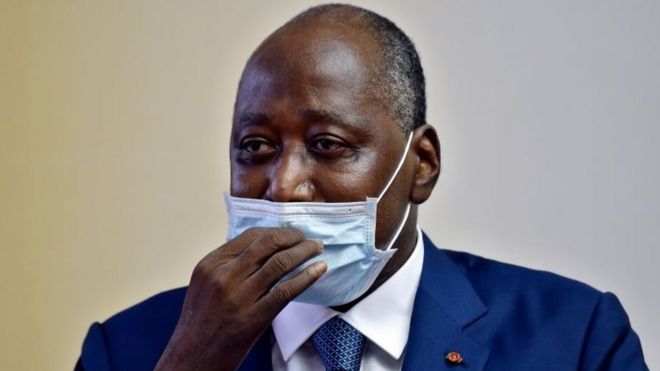Ivory Coast's PM Amadou Gon Coulibaly has died after falling ill at a ministerial meeting.
The 61-year-old had been chosen as the ruling party's candidate for October's presidential election, after Alassane Ouattara said he would not seek a third term in office.
Mr Gon Coulibaly had only just returned from France where he had received two-months' heart treatment.
President Ouattara said the country was in mourning.
He said Mr Gon Coulibaly had become unwell during a weekly cabinet meeting and was taken to hospital where he later died.
His death creates huge uncertainty over the election.
Mr Gon Coulibaly had received a heart transplant in 2012 and had travelled to Paris on 2 May for the insertion of a stent.
He returned last Thursday saying: "I am back to take my place by the side of the president, to continue the task of developing and building our country."
Mr Gon Coulibaly was among the favourites to win the presidential election.
An article in Le Monde on Monday quoted one foreign observer as saying: "If Gon Coulibaly were unfit, Ouattara would have no choice but to run as a candidate because there is no plan B.
"This matter has so far remained taboo because the president has clearly shown his willingness to leave and indicated who his choice was to succeed him."
Mr Ouattara's decision in March not to run stunned the country.
At the time, the BBC's James Copnall from the main city, Abidjan, wrote that there was praise from politicians as Mr Ouattara broke the normal mould for the region of trying to remain in power.
Even then it was clear that Mr Gon Coulibaly would be backed as the successor candidate.
Mr Ouattara's supporters say he has brought economic growth, stability and a renewed standing for Ivory Coast on the international stage.
But opposition politicians - and many Ivorians - say that the president has not done enough to bring the nation together, and heal the wounds of the bitter conflict that divided Ivory Coast and then brought him to power.
Around 3,000 people are thought to have died in the war sparked by candidate Laurent Gbagbo's refusal to accept he had lost the 2010 elections to Mr Ouattara, before troops loyal to the current president arrested Mr Gbagbo in April 2011.
The long-running political disputes between him, Mr Ouattara and another former president, Henri Konan Bédié, have been disastrous for Ivory Coast.
Latest Stories
-
Unichem Group honoured for excellence in pharma wholesale & distribution
4 minutes -
Akufo-Addo’s governance style has landed CJ in this quagmire – Quashie
17 minutes -
North Tongu DCE tours sand winning sites, condemns destructive practices
23 minutes -
AMMREN rallies journalists to champion child health and immunisation
24 minutes -
Huge blast at key Iranian port kills 25 and injures 800
24 minutes -
Africa Development Council urges caution amid growing galamsey protest
28 minutes -
DJ Awana’s one-week celebration [Photos]
29 minutes -
Images of Pope Francis’ tomb released
29 minutes -
Driver of VVIP bus swept away by overflowing River Okye shares harrowing experience
31 minutes -
KATH takes delivery of parts to fix radiotherapy machine, calls for retooling of hospital intensify
37 minutes -
Chancellor of UEW appeals for peace in Bawku
39 minutes -
$58m expenditure on Nat’l Cathedral contributed to our defeat – Bawumia
42 minutes -
Bawumia’s unifying character made him invite his other contestants for the Thank You Tour – Justin Kodua
2 hours -
Cosmopolitan Health Insurance pays 98% of claims, revolutionises healthcare coverage with ground-breaking initiatives
2 hours -
Why NPP lost 2024: General Secretary opens up on Mike Oquaye Report
2 hours

